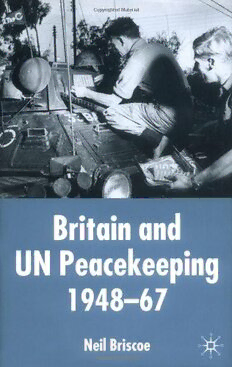
Britain and UN Peacekeeping: 1948-67 PDF
305 Pages·2004·1.176 MB·English
Most books are stored in the elastic cloud where traffic is expensive. For this reason, we have a limit on daily download.
Preview Britain and UN Peacekeeping: 1948-67
Description:
The first comprehensive analysis of Britain's complex relationship with UN peacekeeping operations during two formative decades. It charts the evolution of British views on an international organization running its own military forces and examines policy-makers' efforts to influence, contain and exploit individual operations: in Palestine, Kashmir, Egypt (following the Suez Crisis), Lebanon, Congo and Cyprus. Benefits included shedding colonial responsibilities, containing conflicts, face-saving, and burden-sharing; perceived risks included interference in remaining colonies and threats to postcolonial interests.
See more
The list of books you might like
Most books are stored in the elastic cloud where traffic is expensive. For this reason, we have a limit on daily download.
